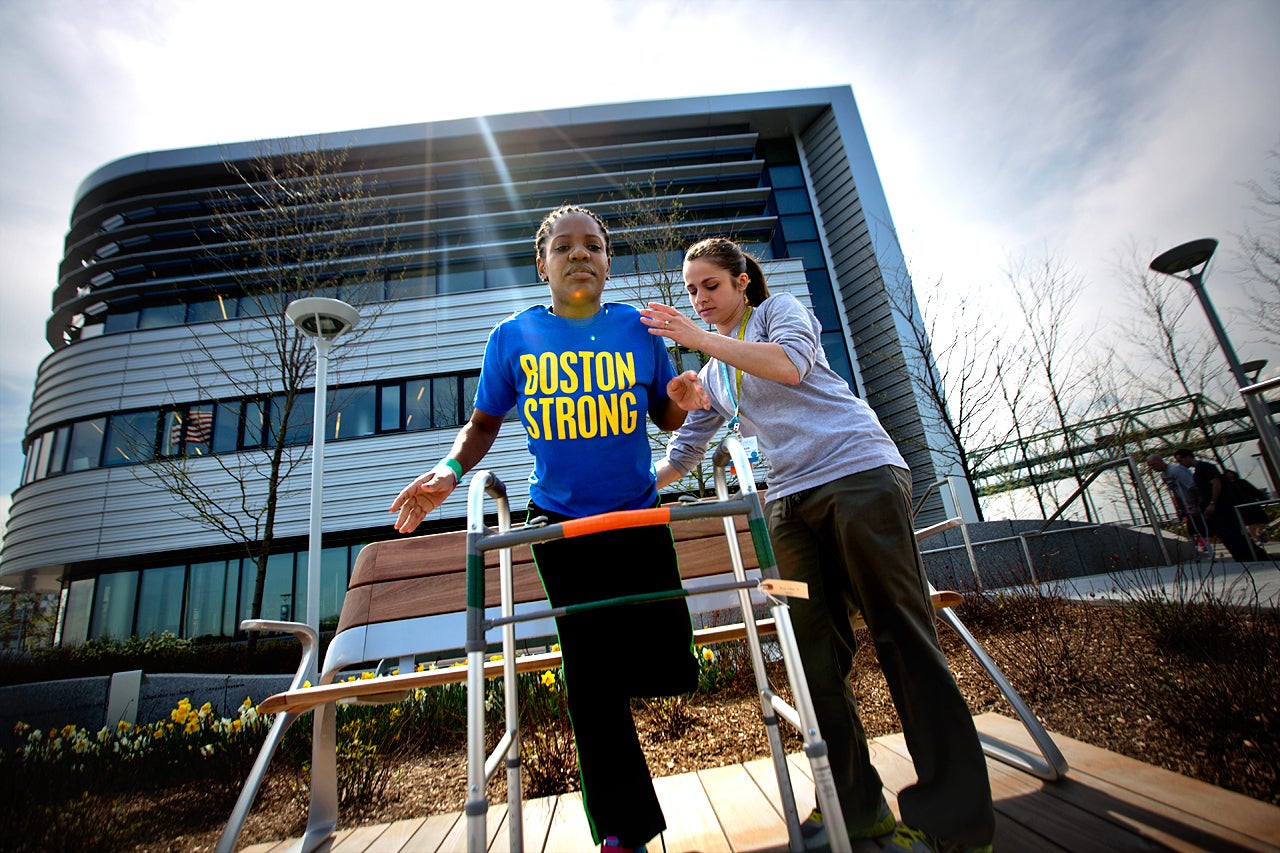
Photo Credit: Jesse Costa/WBUR
Two weeks after terrorist bombs exploded in Boston, I met 31-year-old Mery Daniel in her hospital room at Mass General. An enthusiastic fan of the Boston Marathon, Mery had decided to watch from the finish line this year, arriving only moments before the bombs detonated. In a quirk of fate, Mery did not allow her five-year-old daughter, Ciarra, to accompany her that day, despite the little girl’s pleas to go. A child her size would have never survived the vicious barrage of shrapnel that engulfed that block of Boylston Street at 2:49 p.m. on April 15. Mery’s left leg had to be amputated above the knee and her remaining “good leg” was severely damaged.
As an amputee myself, I had volunteered to come to Boston to help provide the bombing victims with comfort for the present and hope for the future. Walking into Mery’s room that first day, I was completely surprised to discover that a Black woman had been severely injured. It struck me that we really hadn’t seen any people of color pictured or interviewed in the initial news coverage.
Mery and I immediately bonded. I held her hand as a doctor ripped off a bandage to clean her wounds. Lying there so weak in her hospital bed, Mery still had a bright smile, and a wonderful warm personality. I learned she was born in Haiti and had immigrated to the United States at 16, rapidly moving from ESL to honors classes, gaining acceptance to a four-year college from a high school where few make it. She attended medical school overseas, and had been studying to pass her medical boards. Now, with no job and an arduous recovery ahead, her dreams of becoming a doctor are on hold.
As I visited other bombing survivors, I began to notice that they had a very different level of support than Mery did: fruit bouquets, friends and family around them serving homemade cookies, a manicurist, film crews waiting to interview them, donations and offers of help pouring in. In contrast, Mery was getting inspiration from a box of homemade cards sent to all the victims from school children in the area. While her relatives in Boston were there for her, braiding her hair, bringing food, and caring for her daughter, her folks weren’t able to take weeks off work and camp out in her hospital room. Nor did they have connections to create six-figure fundraisers. They were naturally reserved; their instinct wasn’t to pour their feelings out for the news cameras.
To me, it seemed that the bombing survivor most in need of financial support to ensure her future was receiving the least. I decided that I needed to rally a support team to help get Mery the assistance she deserved. Among other things, she needed to relocate from her walk-up apartment, get support in caring for her daughter, and pay for her continuing hospital bills, rehab, prosthetics, and more. So I reached out to some of my media friends and set up a website at www.MeryDaniel.com.
Just as the “Aunties” of African descent around the world gather to unite our community in time of celebration or tragedy, a circle began to form. Suzanne Malveaux set up a live interview on CNN. Church groups offered to do fundraisers. The school kids where Mery’s father works as a bus driver organized a walk-a-thon. Every day, the Team Mery circle grows. Yet, the need is so great and so much work is still to be done. While other survivors have raised hundreds of thousands, our fundraising effort on Mery’s behalf has managed a tiny fraction of that. Now that Mery is out of the hospital and temporarily housed in a hotel near the rehab center, the long, lonely work of learning to walk and live with her injured legs has barely begun. She will need to go through numerous prosthetic fittings as her stump heals. Even with public insurance the co-pay for a prosthetic can run into the tens of thousands, well beyond Mery’s means. And she will need several over her lifetime as a prosthetic leg wears out in 3 to 5 years.
Right now, for Mery, even getting dressed is tough. As she strengthens her remaining leg, she will have to relearn driving, caring for her daughter, the simplest daily tasks. Her life will never be the same, but together we can weave a net of support and create the best possible future for her. Will you stand with the “Aunties” and expand the Team Mery circle to include your friends, your church and your community?
To support Mery Daniel’s recovery, visit:
http://www.gofundme.com/merydaniel
http://www.gofundme.com/MeryRecovery
Olympic skier Bonnie St. John, an amputee since childhood, is the co-author of How Great Women Lead (Center Street).
See Mery Daniel on the cover of this week’s People magazine.